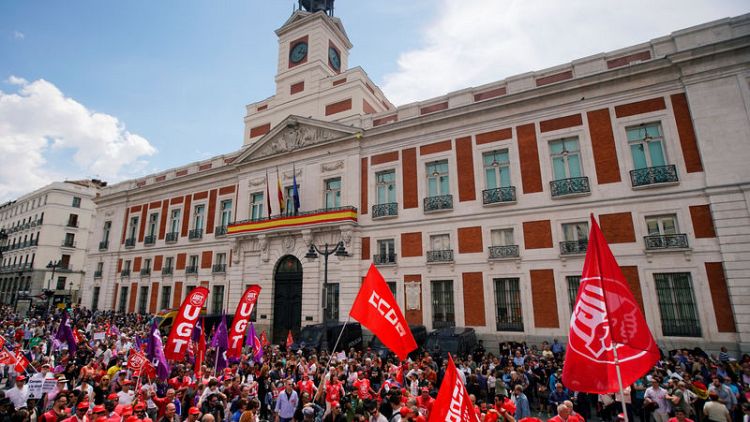By Paul Day
MADRID (Reuters) - Unions used traditional May Day marches across Spain on Wednesday to call on the Socialist Party, which is likely to head the government after last Sunday's election, for pension rises and a roll-back of tough labour legislation.
Prime Minister Pedro Sanchez, who won 123 seats in the 350-seat parliament, must fix labour market reforms imposed by a conservative government from 2012, union leaders told people celebrating International Worker's Day.
"The result of the election has given us the opportunity to face what the unions believe is a political priority; the fight against inequality," Unai Sordo, the head of Spain's largest union, CCOO, said as thousands prepared to march through the centre of Madrid and other towns and cities across the country.
Changes in labour legislation that stripped workers' rights, cuts in public spending and rises in taxes - measures adopted during the crisis - have fuelled a jump in Spanish inequality and growth in insecure jobs, Sordo added, calling on the new government to act.
The conservative People's Party (PP) passed a labour market reform at the height of the five-year economic slump from 2008 to 2013 aimed at making the system more flexible during downturns. Unions claim this increased the number of insecure and temporary jobs in a system already plagued by badly-paid seasonal work in the tourist and agriculture sectors.
Spain's unemployment rate neared 27 percent in 2013 and, while it has almost halved since on the back of an economic rebound, it remains the second highest in Europe after Greece.
Sanchez came to power in June last year after ousting the seven-year-old PP government through a confidence vote following a slew of corruption charges involving high ranking officials within the party.
However, with just 84 parliamentary seats, Sanchez was unable to find support for proposed reforms or his expansive 2019 budget, the failure of which triggered the call for a national election.
Sanchez will begin talks with political opponents, including the PP, market-friendly Ciuadanos and far-left Podemos, which was formed amid protests against austerity plans put in place during the crisis, next week, his office said on Wednesday.
(Reporting by Paul Day, Editing by Angus MacSwan)
